#Trisolaris
Explore tagged Tumblr posts
Text
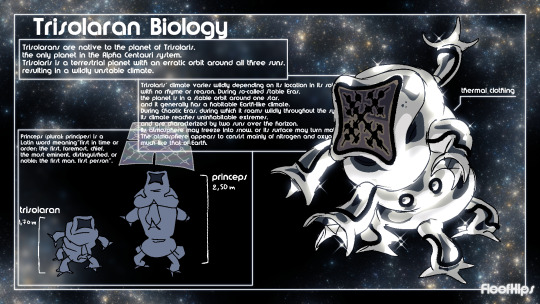
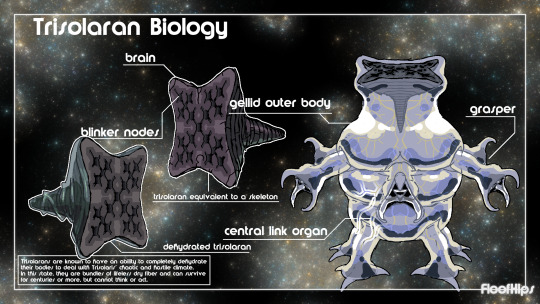
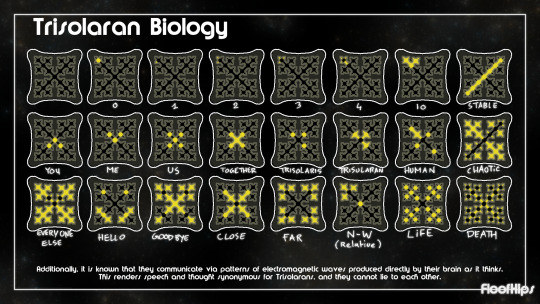
Trisolaran biology :] from the "remembrance of earth's past" trilogy by cixin liu
#the three body problem#the dark forest#death's end#trisolaris#trisolaran#alien#speculative biology#specbio#headcanon#they're just little guys! ok
453 notes
·
View notes
Text
The Real Life Biology of the Three Body Problem Series
In the first book of Liu Ci Xin's Three Body Problem series, we are introduced to our main antagonists, the Trisolarans. Whilst we never get to see them directly, we are shown some of their biology via the game that our protagonist plays.
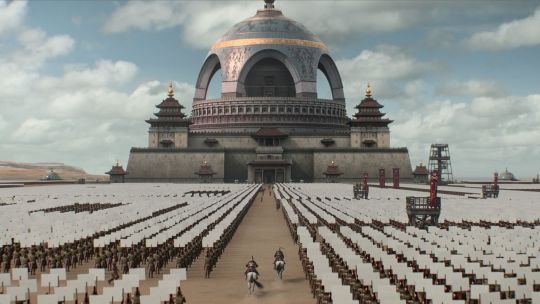
ID: A grand domed palace in a chinese style sits in the background of the image. The foreground has hundreds of ancient Chinese soldiers holding white placards on sticks. Two people dressed in Chinese armour can be seen riding horses towards the palace.
In the game it is revealed that Trisolaris, the planet in the Alpha Centauri system on which the aliens reside, revolves around not one, but three suns. As such, the system is subject to the classic physics conundrum of the three body problem (after which the first book in the series is named), which states that for most initial conditions the trajectories of three celestial bodies is chaotic and difficult to predict.
This means that Trisolaris experiences very extreme, unpredictable conditions, divided into "stable eras" and "chaotic eras". Stable eras come about when Trisolaris settles into orbit around one of its three suns, bringing relative prosperity to the planet. However, chaotic eras result in disasters, such as extreme droughts, seemingly endless nights, and even changes in gravity. The first novel partially revolves around the Trisolarans attempting to see if humans could collectively solve the three body problem and bring some level of predictability to their planet.
During the course of the game, it is revealed to the protagonist (and us, the readers), that in order to cope with the devastation and unpredictability of chaotic eras, the Trisolarans can dehydrate themselves and enter a spore-like state, hibernating until the next stable era comes. This allows them to bypass some of the extreme conditions and ensures the survival of the species as a whole.
Believe it or not, we have our very own Trisolarans here on Earth. In fact, there's loads of examples, from bacteria to triops, to my favourite of the bunch, Bdelloid Rotifers.
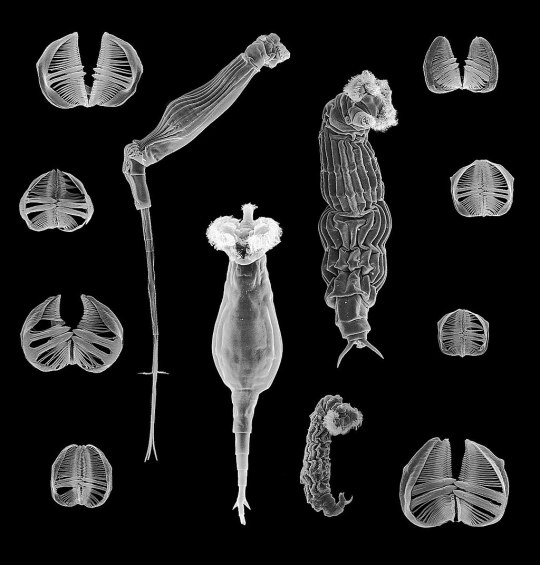
ID: An electron micrograph of some Bdelloid Rotifers and their mouthparts. They are long and slender, with a distinct mouth and tail section. Their mouthparts look like two semicircles lined with a comb-like structure.
These microscopic animals look freaky, because they are. If you've got any media literacy you've probably picked up by now that I am segueing here because they are somewhat similar to the aliens in the Three Body Problem, except this time they are very much real. Like the Trisolarans, Bdelloids live in very ephemeral environments: their usual haunts are the very thin film of water on moss and lichen. As you can imagine, these do not last all that long, and thus when they dry up, so do the Bdelloid Rotifers; in biology, we call this process anhydrobiosis.
"Ok, that's all well and good Ocean Sunfish Hater, but why do you like these guys more than the other anhydrobiotic creatures that roam our good, green Earth?" I hear you ask.
So you know how things that reproduce asexually don't have all that much genetic variation, and how sexual reproduction gives you an edge over asexual populations since you can keep that genetic variation fun and funky fresh, and how that has been the cornerstone for eukaryotic reproduction? Well. Well. Just like me, Bdelloid Rotifers have been completely celibate for 35-40 million years, with some people even bringing that number up to 100 million years, when they diverged from their sister clade. So how do these turbo-virgins not go extinct, racking up tonnes of deleterious mutations, not having any advantageous innovations, and eventually exploding into a genetic soup?
The secret lies in their ability to dehydrate. Not only is it a really handy dandy way to stay alive when your only source of water is gone, it literally rips apart their cells and genes! And why! Why the fuck does that help? It sounds like the opposite of helping!
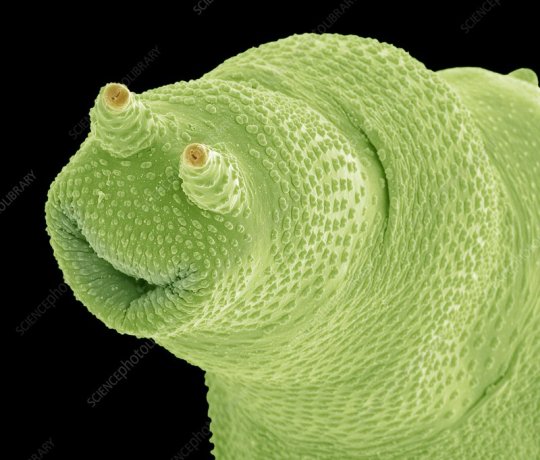
ID: An electron micrograph of the foot of a Bdelloid Rotifer. It has been shaded a light green. The structure looks almost like a face, with a smile and two stalk-like structures that could be mistaken for eyes. But this is not a face.
Having this mild-to-moderate level of cell membrane and chromosomal damage enables the Bdelloids to take up genetic material from their environment, mostly via their digestive systems, where their last meals are slowly being broken down to reveal that juicy DNA inside. When the water returns and the Bdelloids rehydrate, this genetic material gets incorporated into their chromosomes as their cells get back to work repairing themselves. And they sure ain't picky. In fact, it has been shown that in some species of Bdelloids, up to 8% of their genetic material has non-animal origins. How cool is that?
This is probably what has allowed them to continue adapting and evolving, even when they have been reproducing asexually for so long. This strategy has been so successful that the Bdelloids have managed to diversify into over 450 species. Pretty impressive for a class of animals that haven't had sex in over 40 million years.
Perhaps the Trisolarans might have a similar mechanism as part of their biology (even if they do reproduce sexually as stated in the book). Maybe they've managed to survive for this long because they have been able to absorb useful genes from their home planet, just like Bdelloids have been doing here on Earth. I don't know if these are what Liu Ci Xin had in mind when he wrote the Three Body Problem, but they sure were what I was thinking of when I read the book.
If you're still here, thanks for reading! I know this was a bit of a longer post, but I just wanted to use the new Netflix show to talk about one of my favourite books and one of the weirdest, most underappreciated animals.
#I would like trisolaris because the ocean sunfish would not survive there#bdelloid rotifers are so fucking cool and i think more people need to know about them#biology#ecology#Trisolaris#three body problem
106 notes
·
View notes
Text
I’m at the part of the dark forest where luo ji wakes up in the future and i can’t help but think about the clothing. the clothing that flashes moving images. moving images that mimics people’s thoughts or emotions. in the first book, i couldn’t get over what everyone’s predictions that the coming ages of humanity under threat of invasion will be hardened and impoverished and how it mirrors the princeps’ declaration that pretty things like culture was not suited for a civilization under threat. just… the little ways humanity is becoming trisolaran, a little less like humanity when we first meet humans in the first book.
10 notes
·
View notes
Text
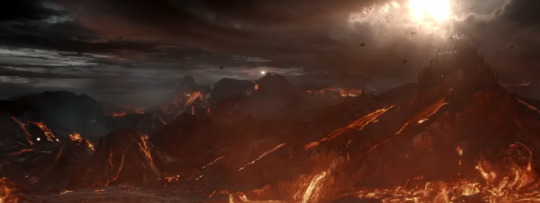
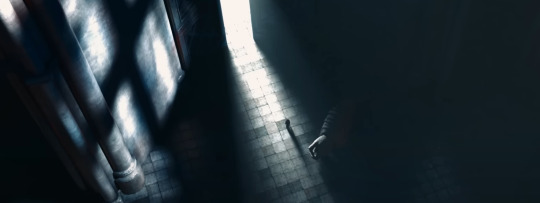
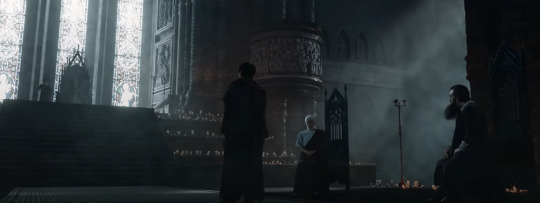
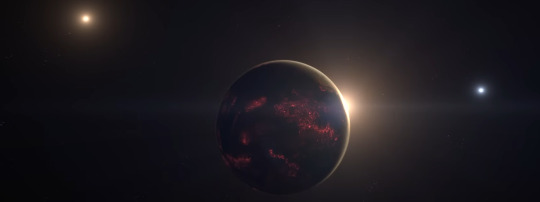
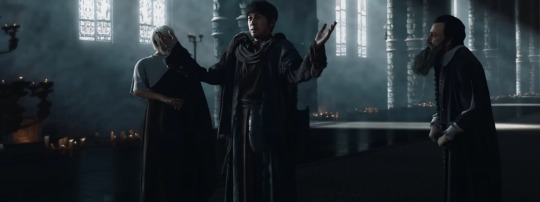
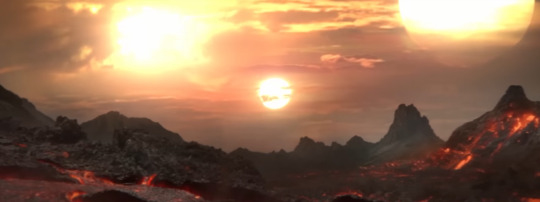
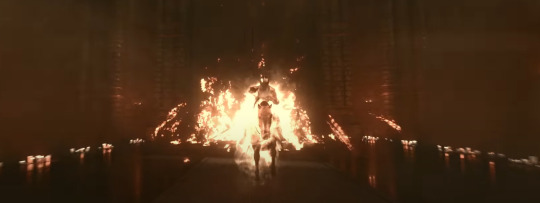
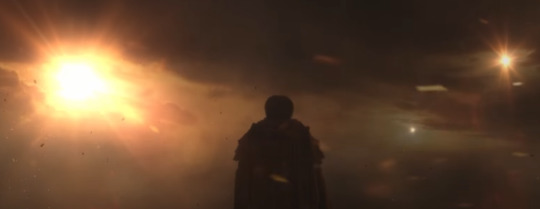
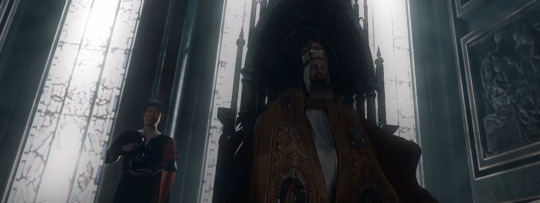
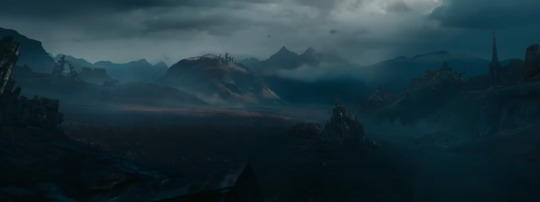
24 notes
·
View notes
Text
TV Shows - 3 Body Problem V
At the start of the third episode, another dead scientist is found. I noticed that I really like Benedict Wong's new voice actor. It gives a clear distinction from his role in the MCU films. Usually, I’m not a fan of such changes, but in this case, it works really well.
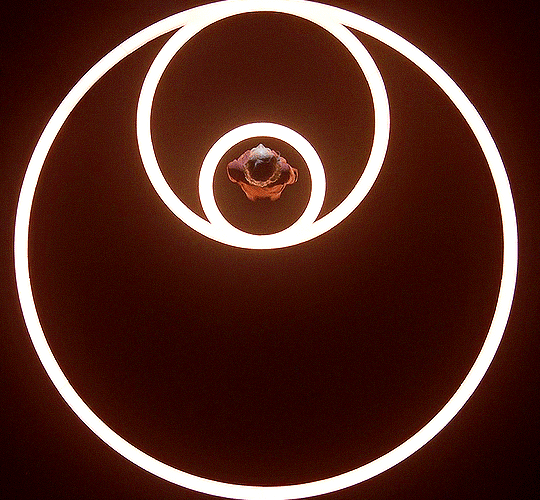
The relationship between Will and Jin is explored in more detail here, which I appreciate because it makes what follows more understandable. In the book, I missed this a bit, even though the author touches on it, but I felt it was a bit brief.
When Auggie discovers the game and rushes to the others, I find what Saul says very interesting, or rather how he says it. It also becomes clear that Jin and Jack don’t fully understand the game’s objective yet. As a viewer, it seems obvious, but from their perspective, it makes much more sense. They don’t know it’s about the three-body problem; they see the game world just as the Trisolarian civilizations do.
Level two also shows that the civilizations are still focusing on the wrong priorities, a point made clearer in the book. Sophon (Tomoko) later explains this. The Trisolarians always focus on survival and realize very late that this isn’t viable and that they need to consider leaving their world. This is where the series could have emphasized the Trisolarians’ dire situation more. The number of civilizations before the fleet launch is only briefly mentioned. (I know this will happen later through Sophon, but it could have been built up a bit better for suspense.)
The games Clarence lists actually exist. Here are the Wikipedia links if you want to check them out:
Romance of the Three Kingdoms
Jet Set Willy
I've been wondering if there’s an equivalent to Jin’s friend in the book, but I don’t think so. There is someone who leads a later operation, like Raj Varma, but I don’t think there’s a connection to Jin in the book.
Ah, now I remember what I wanted to write in the last post. The sound design is worth mentioning. The first time you notice it is when Vera plunges into the tank, but it stands out again in the third episode when Auggie tries to restart the nanofiber project, and the countdown begins again. It’s impressive both visually and audio visually.
What I also like about Sophon’s (Tomoko’s) portrayal in level three is how she floats. Usually, characters that float look like they’re suspended from their hips, hanging like a sack. But here, they did it differently. Either she wears a different harness, has excellent posture, or stands on a post and was then edited in. It looks different and superior, which fits her character perfectly.
I wish they had spent more time on communication and the differences between the two civilizations. (Scene on the Judgement Day with the old Michael Evans)
When Jack and Jin are invited (level four), it’s clear that while the characters in the series have the same traits as their book counterparts, some things are shifted. According to the book, Auggie should be the one to solve the game’s puzzle and go to the summit in London, since she is the series counterpart to Wang Miao, who did all this in the book. (Please don’t take this as criticism; I just enjoy noting these differences!)
Towards the end, Sophon (Tomoko) explains how the Trisolarians ventured into space and how humanity is involved.
Jin and Jack undergo a test to see whose side they’re on. We also see more of Tatiana, who in the book is just a bodyguard for Ye Wenjie. But the kindness of the Trisolarians, shown again through the little girl, doesn’t last long. Thomas Wade and Jin Cheng will learn much more later, which I’m looking forward to because it’s one of my favorite parts of the series.
We know the stakes, the characters involved, and the motives of various factions. But it only gets crazier from here in many ways.
Up to this point, there's a lot that is fascinating and exciting. When it’s later explained how some things came about or how they worked, it may lose some impact, but the explanation is even more fascinating. I find this incredibly exciting and a testament to a high degree of creativity in science fiction.
I found a quote from D.B. Weiss about the series' content and how far they want to adapt the books:
“We always wanted to get to the final page of the third book, and it’s really, really thrilling to us that we will get to do just that.”
This is reassuring, so I don't have to worry about the series ending abruptly or strangely. However, he also mentions that while there’s no episode list yet, there will likely be 8 episodes per season again. This feels too few, and I fear they might leave out important parts or alter too much.
Unfortunately, there aren’t many details available beyond the usual "What we know so far…" videos, which, in my experience, often show that the creators don’t know much and just produce useless content.
#3 body problem#trisolaris#netflix#tvshow#rewatch#tv show#remembrance of earth's past#jess hong#benedict wong#Eiza González#netflix series#netflix shows
4 notes
·
View notes
Text

“I don’t have much to say except a warning. Life reached an evolutionary milestone when it climbed onto land from the ocean, but those first fish that climbed onto land ceased to be fish. Similarly, when humans truly enter space and are freed from the Earth, they cease to be human. So, to all of you I say this: When you think about heading into outer space without looking back, please reconsider. The cost you must pay is far greater than you could imagine. " - Cixon Liu, Deaths End
‘Death’s End’ is the conclusion to the ‘Remembrance Of Earth’s Past / Three Body’ trilogy by Cixin Liu. The series is a sci-fi epic in both the time frame of the series and the content it seeks to cover. The original book covers a period of more than fifty years of Earth’s history, while the second book covers hundreds of years. As for the third, well I’ll just call it a timeframe that the human mind struggles to comprehend.
If you haven’t read my comments on the previous two books, you can find them here:
‘The Three Body Problem’
‘The Dark Forest’
In the interest of avoiding spoilers, I’ll keep the plot very high level.
In the early 21st century, humanity is faced with a threat from an incredibly advanced alien race. During this crisis area, a multitude of unique ideas are explored to try and prepare for the inevitable day when this threat must be faced. The novel explores the difficult choices society and individuals must make in the crisis era, and the ramifications of those choices in the years that follow.
More of the good stuff, more of the same challenges
As I’ve noted in the previous reviews, this series sits in the ‘hard sci-fi’ genre. There’s an emphasis on making the science elements of the world building both plausible and consistent. Some elements of the story are still quite fantastical. As a reader you’re willing to go along with them though because you’ve been on this journey with Cixin Liu long enough to just accept Clarke’s third law “Any sufficiently advanced technology is indistinguishable from magic.”
Where the first book spends a lot of time on scientific puzzles, ‘The Dark Forest’ and ‘Death’s End’ lean heavily into philosophy, politics and cosmic sociology. If you can push through the long winded speeches and set-ups for key events, it’s an amazing experience. Even more so if you’re able to decipher some of the clues laid out through the novel
‘Death’s End’ though comes with some of the same challenges as the earlier books - long monologues and info dumps. But these are magnified by a sense that some don’t advance the overall plot.
The conclusion to the novel may not be to everyone’s liking. I’ve seen people argue it should have wrapped sooner (after the most climatic event in the novel), while others take the view that the conclusion was rushed and could have explored the post-climax events more fully. My personal take is the conclusion was the inevitable compromise between a shockingly abrupt ending, … or writing a conclusion that could almost have become a novella by itself.
Who is this book for?
For casual readers and those who tend to go “eh” when it comes to sci-fi, this probably isn’t the series for you.
On the other hand, this is definitely one for lovers of hard sci-fi. The trilogy is a vehicle for exploring some fascinating and at times confronting themes. It’s worth the investment of your time if you enjoy sci-fi based around detailed world building and big ideas.
3 notes
·
View notes
Text

6 notes
·
View notes
Text
Aliens: Wieso sollten sie friedlich sein?
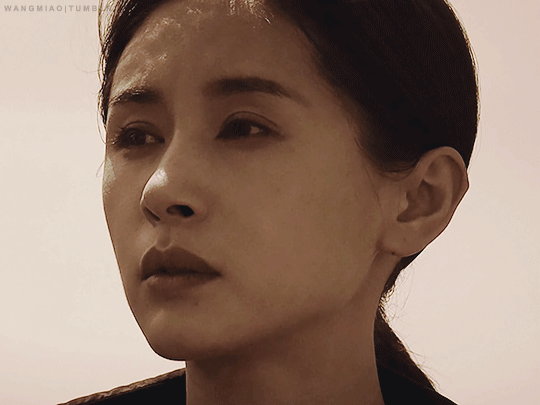
„Es gibt einen seltsamen Widerspruch, der in der Naivität und Gutherzigkeit der Menschheit im Universum zutage tritt: Auf der Erde kommen die Menschen auf einen fremden Kontinent und zerstören dort mit Krieg und Seuchen die verwandten Zivilisationen, ohne auch nur einen Gedanken daran zu verschwenden. Aber wenn sie zu den Sternen emporblicken, werden sie sentimental und glauben, dass es sich bei den außerirdischen Intelligenzen, wenn es sie gibt, um Zivilisationen handeln müsse, die an universelle, edle moralische Regeln gebunden sind, als wäre es Teil eines offensichtlichen allgemeinen Verhaltenskodex, verschiedenste Lebensformen zu lieben und zu schätzen.“
Liu, Cixin. Die drei Sonnen. 11., Korrigierte Auflage, Bd. 1, Heyne, 2017. (Aus dem Nachwort des Autors auf den S. 549 – 556; S. 555.)
Das GIF stammt aus der Verfilmung von «Die drei Sonnen» in der TV-Serie «Three-Body».
2 notes
·
View notes
Text
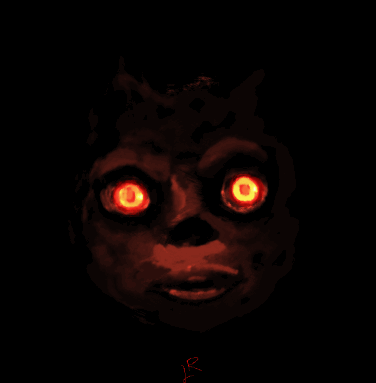
Alien Species: Trisolaran
13.08.2023 / GIF / 376 x 383 / 90 Kb.
Character from Remembrance of Earth's Past book series by Chinese writer Liu Cixin
Trisolarans are a species native to Trisolaris, the only planet in the Alpha Centauri System. They intend to invade the whole universe as a substitute for their endangered homeworld.
#Trisolaran#Trisolarans#Remembrance of Earth's Past#Three-Body Problem#Trisolaris#Alien Species#gif#LR GIFs 2023
5 notes
·
View notes
Text
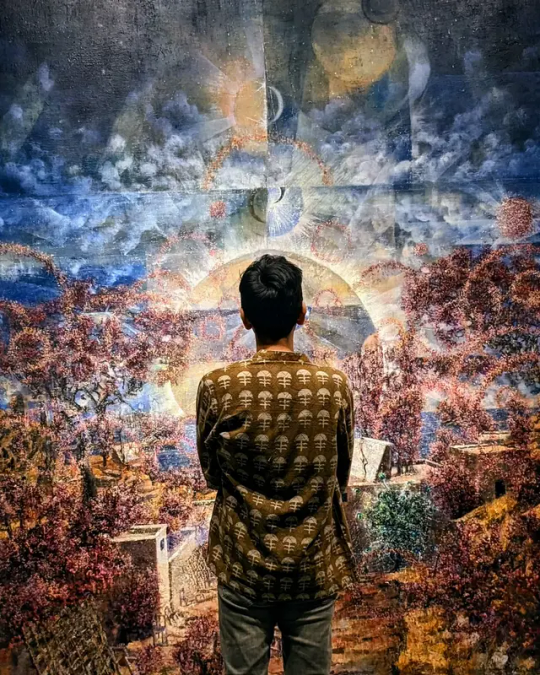


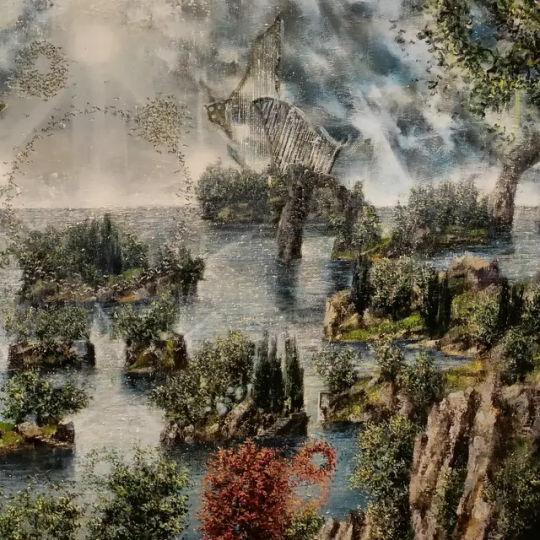

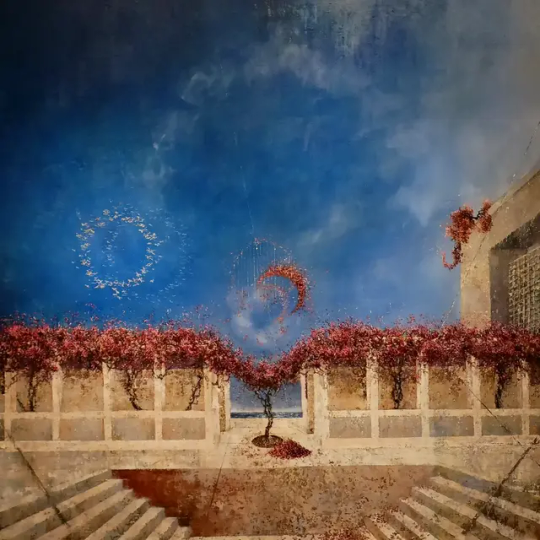




Kunze, Grouper & a harp
Moon is sharp.
Trisolaris.
Proxima Centauri
#michael kunze#prometheus#harp#Galerie Isa#grouper#Moon is sharp#Alien observer#trisolaris#the woods#alpha centauri#proxima centauri
1 note
·
View note
Text
can't believe i finally finished reading the remembrance of earth's past trilogy... only took me 3 years but god damn it was worth it
#yes certain things bother me (the topic of gender and sexuality and sexism in this are. well. they sure are something)#but also. holy hell the existential dread throughout it all#remembrance of earth's past#trisolaris
1 note
·
View note
Text
ngl when the trisolarans invade earth, the yrr (collective amoeba with genetic memory going back as far as 200 million years) would straight chill downstairs in the water. and then when the trisolarans get their heads too far up their asses, the yrr would probably terrorize them long enough to make them wanna go back to their planet-with-three-suns 😂
#the swarm#remembrance of earth's past#frank schatzing#cixin liu#the yrr#trisolaris#real talk#book hoe
0 notes
Text

El bosque oscuro, de Cixin Liu (2008)
#Liu#novela#ciencia ficción#trisolaris#guerra#fin del mundo#comunicación#tecnología#avance#estrategia#futuro#miedo#extraterrestres#literatura oriental#Nova
1 note
·
View note
Text
Hey, so, in the Three Body Problem Universe, do you think they have a parody version of the Trizonesien song but they replaced Trizonesien with Trisolaris?
Wir sind die eingeborenen von Trisolaris~
#the three body problem#the dark forest#dark forest#three body problem#trisolaris#trizonia#trizonesien
0 notes
Text
Hi people, if somebody could find solution to 3 body problem, we will be happy 🥰
1 note
·
View note
Text
TV Shows - 3 Body Problem III
The universe winked at us! Man, I can't get enough of this visual representation. Just imagine that you’re coming home one evening or on your way. The night sky isn’t too obscured by the city's background light, so you can see many stars. Suddenly, everything starts blinking like a TV constantly turning on and off. I praise the creators' creativity here because this visual event is just amazing and surpasses the book’s depiction, even though the same thing happens!
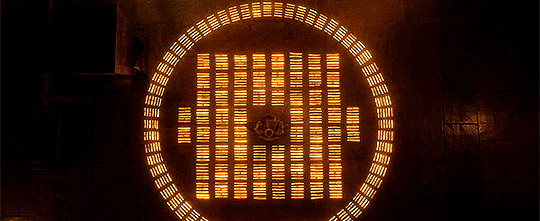
I always have to think about Saul, wondering if he is Lou Ji, as it fits with what happens later, especially in the conversation with Ye Wenjie as they mourn her daughter Vera.
Auggie is definitely Wang Miao. In the book, he is practically used to introduce the story, and he is also the person who sees the countdown. Again, the visual representation in the series surpasses that in the book.
But with all the comparisons, we can’t forget Da Shi, played by Benedict Wong. Interestingly, his character's name was changed in IMDb; he was originally called Clarence Shi. I found him fascinating in the book, and it's the same in the series, even though he is portrayed a bit more moderately in the series than in the book. Still, his traits from the book are recognizable.
In general, the series explains a lot, which the book, being hard science fiction, does less often. Although there are explanations for various names and terms at the end of each book, the characters don't always explain everything in the book.
Please excuse all the comparisons with the book; I’m just fascinated by how some things were implemented. Sure, I could sit and complain about all the changes, but what would be the point? I prefer to enjoy the portrayal and explore the differences.
Jin Cheng now really experiences the game for the first time, and we also learn more about the Trisolarans. I understand that they had to cut some parts, and thus we don’t learn much about this civilization yet. In the books, this information is also spread out but with higher intensity. I hope more will be revealed later.
One thing I want to highlight is the music, which was excellently chosen and composed by Ramin Djawadi.
In the German dubbing, she has a great voice (yes, I have a strong affinity for voices and dubbing), and in the second episode, we meet her for the first time, Sophon! That’s her name in the series and on IMDb, but in the book, based on her description and role, she should be Tomoko. We’ll get to know her better later, but she is already a fascinating character.
Jack is actually a character that annoys me a bit. I can't think of an equivalent in the book, and I don’t know why he is portrayed so drastically in the series. The question is if he is only there to give Will his money so he can buy the star for Jin Cheng, thus setting further events in motion.
This brings me back to the thought that Netflix might make a cut and not show everything from the books, but rather end at a certain point, though I wouldn't know what the right place would be. I also wonder what from the books will be included because there are many main locations and also some side plots. Yes, the character development is super exciting, and I am looking forward to that, but what’s coming and how it will be portrayed is another level of excitement. Especially the events from the last book—there's one thing I’m curious if they will include or not, because the way it's depicted will be, in my opinion, a real challenge. I'll reveal exactly what I mean at a later time.
What I find pleasant, and this aligns mostly with the book, is the location. Not in big America, but in England, which is just as fascinating and a nice change since it’s not so overdone.
I’m curious why some things were "toned down." The fate of the Trisolaris civilization is much more devastating in the book than shown in the series. The planet they live on was torn apart many eras ago. The civilizations that have gone through it number over 900 in the book, but a bit less than 300 in the series. They could have amped up the drama here, just like the later event involving Will.
#3 body problem#trisolaris#tvshow#rewatch#tv show#remembrance of earth's past#jess hong#benedict wong#Eiza González#netflix#netflix shows#netflix series
5 notes
·
View notes